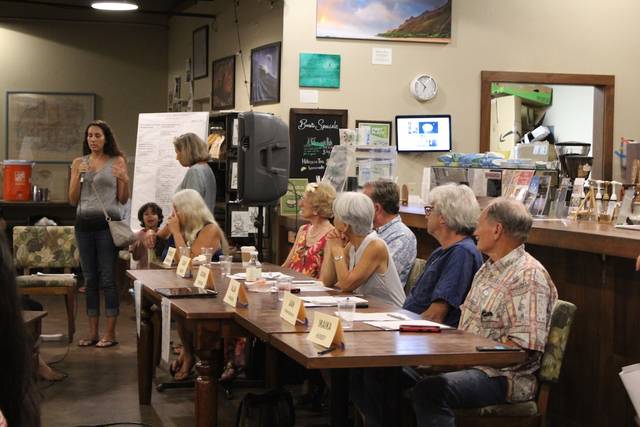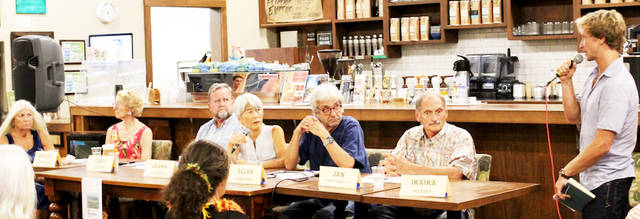LIHUE — Armed with sample ballots, notebooks and questions, about 60 people crowded into Ha Coffee Tuesday night to learn more about what they’ll be voting on Nov. 6.
Six panelists discussed seven questions for about two hours.
All panelists represent different organizations, but they’re here representing personal opinions, said moderator Lana Olson.
“They represent a diverse set of opinions,” she said.
Panelists were former nurse, lawyer and activist in Friends of Mahaulepu, Bridget Hammerquist; former Kauai Council member and executive director for the Pono Hawaii Initiative, Gary Hooser; Councilmember JoAnn Yukimura; journalist Allan Parachini; former journalist and owner of Island Strategy communications consulting, Jan TenBruggencate; and Ikaika Hussey, editor and publisher of Summit and The Hawaii Independent.
State of Hawaii Constitutional Convention Question: Shall there be a convention to propose a revision of or amendments to the constitution?
This question appears on the ballot every 10 years and offers the chance to gather delegates from across the state and make changes to the state constitution.
The panel pointed out the ability to directly influence the constitution, but also that the convention is a costly endeavor and money could be used elsewhere.
Blank votes and mistakes are counted as a vote in favor of holding a constitutional convention on this question.
Hussey argued in favor of voting yes on the ballot and holding the constitutional convention, but he started his argument stating if the constitutional convention isn’t voted in, “that’d be fine.”
It’d be a chance to find solutions to the housing and education crises, he said, and make improvements — especially in light of changing times.
“Think about what future do we want for our islands,” Hussey said. “What does democracy in the 21st century look like?”
Parachini presented the opposite viewpoint, and pointed out a lack of passion and no sense of urgency surrounding the idea of holding a constitutional convention.
In the end, the convention would cost somewhere around $55 million and he said there are better ways to use that money.
“What would it add that we aren’t already hearing?” he said.
Yukimura added she thinks it’s risky business tampering with the state constitution and suggested a no vote on the question.
“The chances are risky for getting something better,” she said.
Relating to the Public Defender: Shall the charter be amended by repealing Article IX, Public Defender, as this function is already provided by the state?
Tenbruggencate argued a yes vote on the question related to the public defender, because it’s redundant and the position isn’t filled at County of Kauai as it is.
The public defender section of the charter was made obsolete in 1968, when the state constitution mandated the state provide counsel to indigent defendants and the amendment would remove the article from the charter.
“It’s unlikely that anyone would ever or should ever fill the position,” he said. “The county has so many competing needs, it’ll never be funded. It should be removed because we want a simple, clean guiding document.”
Hammerquist argued for a no vote on the ballot, which would keep the public defender from what she called a “practical” point of view.
“It’s not costing anything,” she said. “The language is there, the framework is there.”
She pointed out the cost of restructuring the article should it be necessary, including lawyers to draft the language, marketing so the public can understand the issue, and the time before the charter commission.
Some audience members asked questions throughout the debate on the public defender question, including Anna Mo Des, who said social justice defense is “essential” and shouldn’t be removed.
“Our world is greatly changing and to say this position is unnecessary hopefully isn’t true,” said Katherine Wilson from the audience.
Relating to the Electric Power Authority: Shall the charter be amended by repealing Article XXX, which empowers the Council to create an electric power authority by ordinance?
The article empowering the Council to create an electric power authority was approved by voters in 2002 and allowed the county to intercede in the event that the sale of Kauai Electric to Kauai Island Utility Cooperative collapsed, or if KIUC ran into problems providing services.
Yukimura argued for the yes vote on the electric power authority question, and pointed out that KIUC’s stable track record and governing board with member buy-in are working, and the article should be removed from the charter.
Removing unnecessary language streamlines the charter for a better guiding document.
“Vote yes to remove this from the charter,” she said. “If KIUC goes off track, there are remedies.”
Hammerquist again argued in favor of a no vote, meaning to keep the article in the county constitution, for the same reasons she argued a no vote on the public defender question — there’s no need to remove it if it’s not causing problems.
“I’m not opposed to KIUC, but there is a potential something could happen to the co-op and having the chance to create an ordinance there let’s the council step up,” she said. “Rather than repeal and delete, leave it there. It’s not costing the county anything.
Relating to the Kauai Zoning Board of Appeals: Shall Article XIV, Planning Department, Sections 14.01 14.03, 14.12, 14.13 and 14.14 be amended by removing all references to the zoning board of appeals?
Most of the panel argued for a yes vote on this question, with Parachini taking the lead and saying the zoning board of appeals was a “noble experiment that failed.”
Adam Roversi, county attorney and candidate for county council, said the zoning board of appeals was created because of an influx of transient vacation rental appeals to the planning commission.
“All those cases clogged (the system),” Roversi said. “It’s still the same situation.”
The cases are being handled by public defenders, but the zoning board of appeals was created to help take the pressure off of the planning commission — but volunteering to sit on the board is a tall order to fill and it’s never been created.
“It was a lot to ask laypeople to review decisions,” Hammerquist said. “They couldn’t constitute a board.”
Hooser cautioned against removing things from the charter without careful thought and Mo Des spoke up from the audience, voicing the same hesitation.
“I’m concerned about cutting away anything already established just because we can’t fill the position,” she said.
Yukimura said removing the article would create the best situation in the matter.
Relating to the Public Access, Open Space, Natural Resources Preservation Fund: Shall Article XIX, Financial Procedures, Section 19.5(c) be amended to permit the Public Access, Open Space, Natural Resources Preservation Fund to include improvements?
A yes vote would expand abilities from just acquisition of land to improvements.
Roversi pointed out since 2002 the county has only acquired two parcels through the fund and the option to improve the sites would only apply to those — both of which are part of the Black Pot Beach Park plan.
Tenbruggencate argued in favor of a yes vote, highlighting the need to open up beach and mountain access for residents.
“The goal is to allow some money to be used for initial improvements, and then the county takes over from there,” Tenbruggencate said.
Hooser and Yukimura both argued for the no vote on the question, saying money should be available in other parts of the budget for land improvement and increased access.
“The purpose of the fund is to buy land to hold in perpetuity, not to acquire land and then build on it,” Hooser said. “This is a dedicated fund. Vote no.”
Relating to the Salary Commission: Shale Article XXIX, Salary Commission, Sections 29.01 and 29.03 be amended to give the salary commission authority to establish the maximum salaries of all elected and appointed officials, and to add the director of human resources and the director of finance as ex-officio non-voting members of the commission?
Panelists said a yes vote on this question would remove the Kauai Council’s power to veto salary committee recommendations — meaning the salaries for department heads and mid-level staff.
Tenbruggencate argued in favor of a yes vote on the grounds that the citizen committee isn’t now allowed to exercise it’s full power without decisions being vetoed by the council.
“Repeatedly after the commission does their work, county council members have cut back (and made changes),” Tenbruggencate said. “Let the citizen community do its job without the veto from the council.”
Hooser and Yukimura both argued in favor of a no vote on the question, pointing out council veto is a way for the public to intervene in setting salaries for county department heads and mid-level positions.
“The salary commission doesn’t look at the budget,” Hooser said. “It’s the council’s responsibility to look at this, too.”
Relating to term limits for the office of Councilmember: Shall the term limit of office for council members be removed?
Currently council members term out at eight years — serving no more than four consecutive two-year terms — and a yes vote on this question would remove that limit.
All of the panelists argued for a no vote on the term limit question.
“Term limits give us a moment to step back and form a new perspective,” Yukimura said.
Tenbruggencate pointed out conserving the intellectual vigor and experience on the council could be a benefit.
Parachini and Hooser both said that they thought the timing of the question made it self-serving for one specific person: councilmember Ross Kagawa. He is looking at terming out in 2020, when the measure would take effect.
In the 2006 general election, voters resoundingly supported the establishment of term limits for county councilmembers, with 13,377 votes for term limits and 6,139 no.
“The message has been clear in the past from voters that they don’t want term limits, and all the counties have term limits. One of the chief proponents is Ross Kagawa, who would be most affected,” Parachini said. “It’s self-serving.”
Hooser added: “I support what Allan just said. A philosophical argument could be made for or against, but this appears to be self-serving at a minimum. The impulse is to vote yes, but the answer is no.”
Early voting is ongoing through Saturday at the Historicl County Building annex.
•••
Jessica Else, staff writer, can be reached at 245-0452 or jelse@thegardenisland.com.




“Blank votes and mistakes are counted as a vote in favor of holding a constitutional convention on this question.”
Wrong. The exact opposite voting rule applies: Blank votes and mistakes are counted as no votes.
..these issues written by lawyers so no one understands them, jokes on us…
Charlie